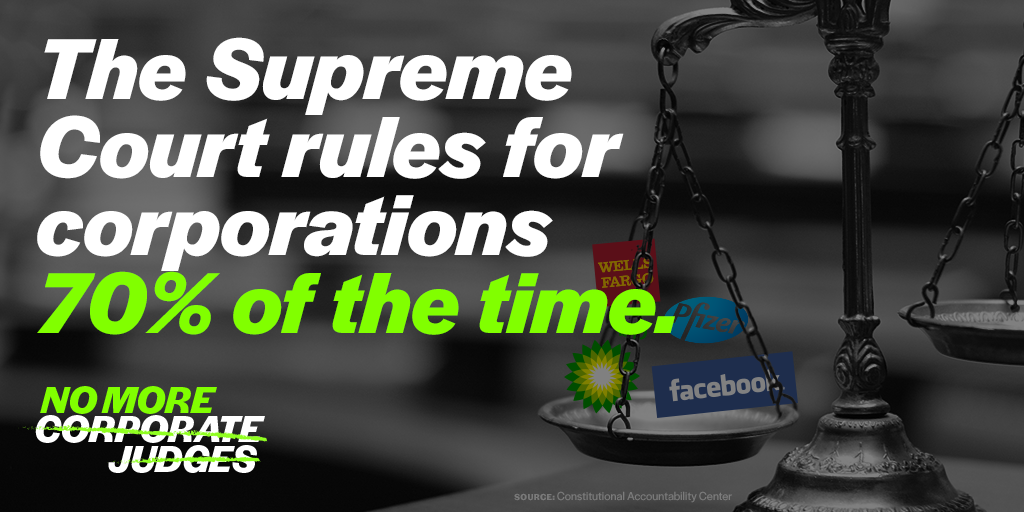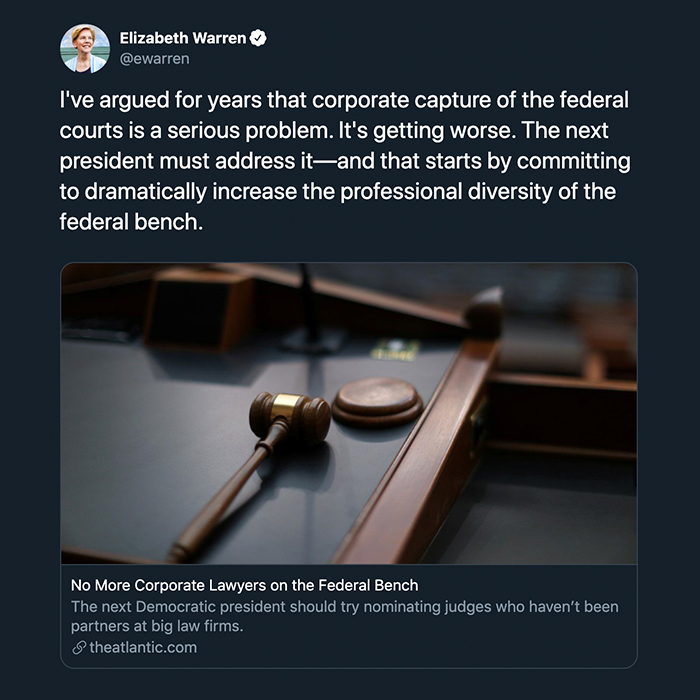Corporate America’s grip on our federal courts is tightening.
Since John Roberts became Chief Justice of the United States in 2005, the Chamber of Commerce has won 70 percent of the time before the Supreme Court. This win streak includes landmark rulings that have allowed unlimited corporate cash to be spent on federal elections, expanded the use of forced arbitration in employment and consumer contracts, and hurt public-sector unions’ ability to collect fees to fund their activities.

READ OUR OP-ED MAKING THE CASE
The combination of rising corporate power and eroding legal protections for workers and consumers has resulted in a system that empowers corporations to take advantage of individuals with near-impunity. This trend has fed the massive transfer of wealth and political power away from everyday Americans and toward large corporations and their shareholders.
The next Democratic president must nominate judges who represent the antithesis of this. The federal bench has become wildly unrepresentative of the legal profession as a whole.
Six in 10 sitting federal appeals court judges are former corporate lawyers.
We must restore balance and bring diversity to our courts. This means not nominating corporate lawyers and instead prioritizing labor lawyers, public interest lawyers and academics who have studied the law from the vantage point of workers and consumers.
We define a “corporate lawyer” here as a lawyer who has achieved partner status at a corporate law firm—such as the large firms known collectively as Big Law—or has served as in-house counsel at a large corporation. This would mean lawyers who briefly worked as associates at corporate firms at an early phase in their careers would still be eligible for the federal bench.
While a corporate lawyer certainly is capable of becoming a fair-minded judge, and a judge’s legal background is not inherently predictive of how she will rule, the federal bench simply is already filled with enough corporate lawyers. And for all the examples of progressive judges who spent time in Big Law, there are many more brilliant legal minds whose careers too often, perversely, prevented their consideration for the bench. There are plenty enough highly qualified individuals with other backgrounds—civil-rights litigators, public defenders, and legal-aid lawyers—that the next president can afford to make identifying new types of candidates a priority.
Nominating more corporate lawyers would amount to a political surrender to the right’s vision of what background makes for an acceptable judge, and conceding to those terms would sharply limit the diversity of views on the bench and hamper progressive ideals.

Democrats must burst the bubble that insulates the Supreme Court and the corporate lawyers who practice before it. There is an entrenched, back-scratching network of legal elites who work together to promote corporate interests. A Reuters study called it “a self-replicating group of insiders” and “a decided advantage for corporate America.”
When it’s Democrats’ turn to nominate judges again, we cannot simply return to business as usual. Instead, we must nominate judges who have a more diverse array of experiences, who can help their colleagues more fully understand the competing perspectives on the law that come before them.
Sen. Harkin cut straight to the point — the next Democratic president needs to put people over corporations. #NoMoreCorporateJudges pic.twitter.com/q6kyNqmIDn
— Demand Justice (@WeDemandJustice) August 30, 2019


